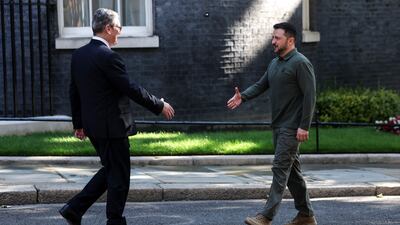When Ukrainian President Volodymyr Zelenskyy became the first foreign leader since Bill Clinton to sit in a UK cabinet meeting last week, the pictures told a story of where the British national interest lies.
There have been four UK prime ministers since Russia’s full-scale invasion of Ukraine began in February 2022. Keir Starmer is not alone in hoping that there is not another one before the war ends.
The UK is in the unfamiliar position of offering an outlook of stability at a time when turmoil is stalking other key members of the G7.
Mr Zelenskyy arrived in the UK on a mission to ensure that London remains its loudest supporter when it comes to sanctions, arms supplies and diplomatic heft against Russia. Personalising his appeal, the Ukrainian leader said he wants Mr Starmer to show that he is a strongman in the face of international aggression.
That is obviously something Mr Starmer will have to decide on for himself, for it will be an important part of defining his premiership. To go back to the national interest mentioned at the top, Ukraine is certainly part and parcel of how Mr Starmer wants to change the UK with his overwhelming parliamentary majority.
Labour sees defence as an issue that it can own. With the first duty of any government being to defend the country, Mr Starmer sees an opportunity in the reindustrialisation of the UK. It sees the rearmament of Europe as a trend that can boost its own agenda.
Defence is a core national industry that has already sparked into life as a result of the nature of the threat posed by the war in Ukraine. Making things is suddenly the emphasis of defence, and the British think they are well placed to gain from this process.
BAE, the largest UK defence firm, is one of the main shareholders in the European missile consortium MBDA. It has moved to Ukraine, with a factory line to make artillery guns, and is also running maintenance and repair services for weapons supplied by the UK within the country.
There are others, too. Babcock International has financing from the UK Ministry of Defence to provide operations involved in the maintenance, repair and asset management of vehicles. Last week, officials revived the UK’s ability to produce forgings for gun barrels, working in partnership with Sheffield Forgemasters, supporting the repair and overhaul of Ukrainian vehicles. The claim is that this is a first step towards sovereign barrel production.
A few hundred German Leopard tanks, a couple of dozen Abrams tanks from the US and more than one dozen UK Challengers are other illustrations of western support. Only this month, Czech President Petr Pavel’s efforts to supply artillery shells to Ukraine have resulted in a deal to build a new factory, rather than scurry around the world to buy up stores.
So far, the Europeans and Americans have been sluggish in the production needed to match Russia on the battlefield. But the UK defence industry’s support means that Ukraine’s armed forces should be able to rely on more to keep it in the fight.
There is a sense in the Labour party that Ukraine is only just the taster of the opportunity. It has a project to overcome Brexit that in these early days has no final destination.
Look at the graph of EU arms imports: it has shot up on an annual basis from about €2 billion ($2.2 billion) in 2022 to more than €5 billion last year. The trajectory is only going one way and supplying this market presents the UK with a huge opportunity, especially in a world where trade barriers are only rising.
There is, however, a threat to such an opportunity given that the EU disregards the UK as a pillar of European defence. This isn’t just about trade barriers, such as tariffs, but the tendency to exclude the UK from the continent’s build-up plans.
While Mr Zelenskyy was meeting the UK cabinet, Ursula von der Leyen was being endorsed by the European Parliament for a second term as European Commission President.
In the political guidelines that she issued for the next European Commission, there is a commitment to appoint a defence commissioner for the first time. This cabinet-level appointee would be charged with delivering a white paper for common European defence programmes within 100 days of taking office.
The Brussels-based think tank Bruegel has warned that one of the prime challenges for this paper is if a “strategic industrial policy in the defence sector should really be focused only on the EU, or whether it should include partner countries such as the UK and Japan”.
The Europeans promised Ukraine a million shells a year, but another think tank, the London-based Royal United Services Institute, projects it will reach this high-water mark only by 2026. There is an obvious gap that the UK’s capital and expertise in the defence sector can potentially fill. London will be hoping that an opening will be left for its participation.
Labour will also be hoping to boast that it is the party of the masses once again, as it aims for mass production of arms systems not just for the UK but for its neighbours, too.











